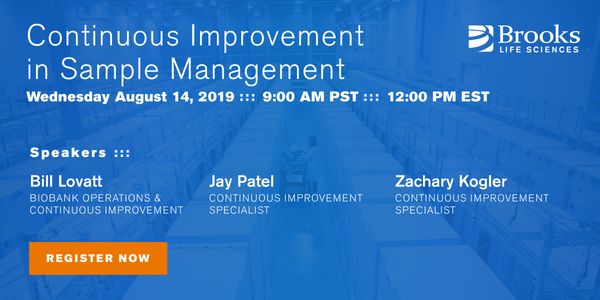High Throughput
High throughput cell biology is the use of automation equipment with classical cell biology techniques to address biological questions that are otherwise unattainable using conventional methods. It may incorporate techniques from optics, chemistry, biology or image analysis to permit rapid, highly parallel research into how cells function, interact with each other and how pathogens exploit them in disease. High-throughput biology serves as one facet of what has also been called "omics research" - the interface between large scale biology (genome, proteome, transcriptome), technology and researchers. High throughput cell biology has a definite focus on the cell, and methods accessing the cell such as imaging, gene expression microarrays, or genome wide screening. The basic idea is to take methods normally performed on their own and do a very large number of them without impacting their quality.
-
DEC 05, 2019 | 9:00 AMDATE: December 5, 2019TIME: 9:00am PST, 12:00pm EST Characterization of the spatial distribution and abundance of proteins and mRNAs with morphological context within tissues e...Speaker: Mathias Holpert, PhD , Traci DeGeer, BS, HT (ASCP) HTL, QIHCSponsored By: Leica Biosystems, NanoString TechnologiesNOV 19, 2019 | 8:00 AMDATE: November 19, 2019TIME: 8:00am PTCentrifugation has long served as a critical separation tool in countless research and production facilities spanning a wide range of discipline...Facioscapulohumeral muscular dystrophy (FSHD), one of the most common forms of progressive muscular dystrophies and is often conventionally diagnosed by Southern blot analysis. The accurate d...Speaker: Alka Chaubey, PhD, FACMG














![Bacteria, environment and function: the basis of microb[iom]e annotation](https://d3bkbkx82g74b8.cloudfront.net/eyJidWNrZXQiOiJsYWJyb290cy1pbWFnZXMiLCJrZXkiOiJ3ZWJpbmFyX3Byb2ZpbGVfaW1hZ2VfMjJhYWY2ZTZlM2JjYjA3OWI0MGI2MWUzYmFiYWFiZDFhNDIxODM4NF84NjM1LmpwZyIsImVkaXRzIjp7InRvRm9ybWF0IjoianBnIiwicmVzaXplIjp7IndpZHRoIjoxNTAsImhlaWdodCI6MTUwLCJmaXQiOiJjb3ZlciIsInBvc2l0aW9uIjoiY2VudGVyIiwiYmFja2dyb3VuZCI6IiNmZmYifSwiZmxhdHRlbiI6eyJiYWNrZ3JvdW5kIjoiI2ZmZiJ9fX0=)









